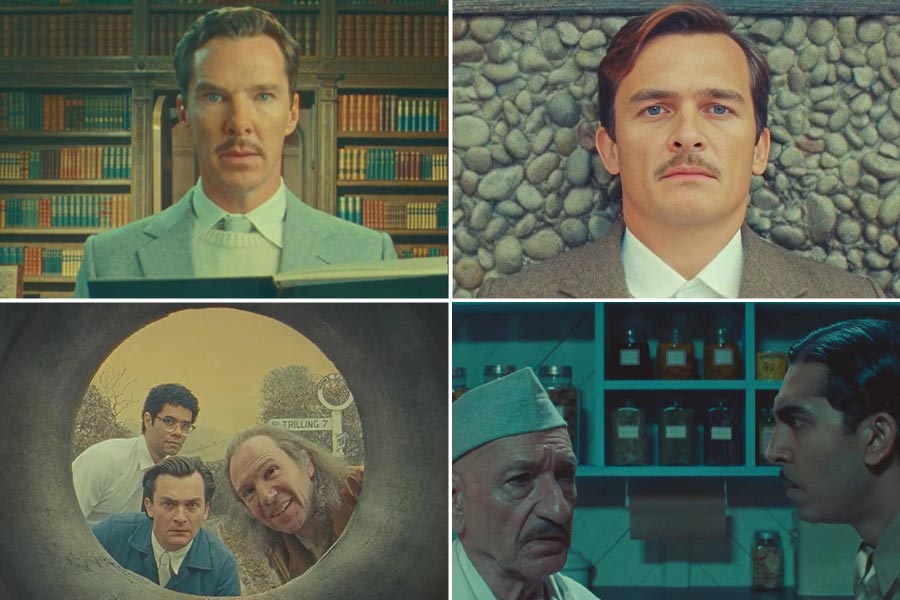Wes Anderson’s most recent project adapts beloved children’s author Roald Dahl’s various short stories into a four-pack of cleverly winsome tales. When I heard of this project, I was practically giddy at the thought of the combo of both Anderson and Dahl we would be receiving. Dahl, known for his eccentric and nonsensical fiction blended delightfully with Anderson’s visually surreal and whimsical film style.
Although you don’t have to watch the shorts in any particular order, the first released short “The Wonderful Story of Henry Sugar” introduces Dahl as the narrator of his stories. Chronicling his narratives from his messy workshop/home, the “Gipsy House,” which is supposed to be accurate to the writer’s Buckinghamshire home.
Anderson has been very public about his admiration for Dahl’s work ever since he was able to create his own adaptation of the book “Fantastic Mr. Fox” by Dahl, which is one of his most acclaimed motion pictures. In a promotional video for the film, Anderson talks about what it was like visiting his idol’s home.
After we’re introduced to Dahl, we’re immediately immersed into the short story, in a very Anderson fashion. Henry Sugar, our protagonist, a wealthy, avaricious man reads a medical report about a patient who was able to see without using his eyes. Sugar is enamored with this miracle and immediately applies it to furthering his rapacity by attempting to hone this skill to accelerate his toxic gambling career because he’d be able to see through the cards.
You could tell Anderson had fun with this short by all the creative mediums he was utilizing and creating in each scene. For a major portion of the short, we follow the patient Sugar is so fascinated with and Anderson went mad with the number of innovative shots. There’s a scene towards the beginning where they test the patient’s sight ability and chase him down throughout the hospital, where the camera becomes one of the chasers, frantically following the man with the characters in the scene. I loved this point of view shot because it gave an insider perspective into the characters of the shot.
I think my favorite scene of all the shorts was where the report recalls an anecdote of the patient’s, and the scene he describes is recreated in stop motion behind him. It carries such simple ingenuity, but because it was executed by Anderson it made for an incredibly well-done shot.
Anderson is also known for his rapid pace and his character’s deadpan monologues whilst staring at the camera, which are usually qualities that I can sometimes find gradually irksome, but I think Wes perfected this skill in these shorts, especially in TWTOHS.
Not only this, but he created a behind-the-scenes feel by using imaginary crops and making everything feel particularly rushed, which added a charming wittiness. This contrasts to the very organized, clean-cut shots in his other films. Watching this felt like viewing an entirely new film style, I found the only work I could compare it to would be that of “Series of Unfortunate Events,” which has a very similar narrated, behind the scenes feel.
The next released short, “The Swan” was an acute emotional turn from TWTOHS. Based on a tragic true story, it follows a small, particularly brilliant young boy who is tormented by two ignorant teenage bullies. The boy, Ernie, is put through horrendously cruel events, no purpose is given, just pure unadulterated malice. When the bullies shoot a swan, which Ernie warned against, the events that follow are some of the most abhorrent scenes I’ve ever seen in a movie.
The horror I felt was from knowing the story was something that actually happened to some poor child in real life, but also the way in which Anderson stylistically depicted it. There was almost no gore, no actual sight of cruelty- which made the emotion that much more tangible. His capacity for emotion is something many of his critics claim he lacks, but I’d tell them to watch this film and see if they still think he lacks emotional appeal.
The third released short, “The Rat Catcher,” was certainly the least stylish or comedic and that’s why I’d probably rank it as my least favorite short. This short, guided us through a strange encounter with a rat hunter who knows the ugly truth about rats. It contained the most oddities of any other short, which usually I’d appreciate, but I think it wasn’t executed as well as it could’ve been. For example, it felt much slower than the other shorts which negatively affected the comedic timing, overall flow, and viewer’s interest. The only aspects that had me actively interested was actor Ralph Fiennes’ portrayal of the Rat Man, the stop motion rat and Dahl’s language. Dahl’s words served as the core energy of many scenes, which saved “The Rat Catcher” in that regards.
At the end of the short, Anderson includes a morbid note of Dahl’s discussing man’s capacity of cruelty or tenderness, which seemed to be a common theme in all the shorts. He depicts man as animalistic in their portrayal of emotion, comparing them to a rat, a swan.
In the last released short, “Poison,” Anderson taps into his utilization of tension and anxiety by illustrating an Englishman lying in a bed, claiming a lethal snake is under the covers. Immediate suspension and terror overcome the viewer, this, I think Anderson did very well.
Like Henry Sugar, “Poison” was riddled with creative shots. Anderson employed countless angles, light techniques and split screens to create the tension I mentioned before.
What I didn’t value as much was the incredibly confusing ending with no explanation. This is very akin to his usual style, except the ending for this film just left me disoriented and confused as to what the purpose of the film was.
What most surprised and excited me in these shorts is how much I laughed, which has been not present in some of his more recent movies. I’m excited for his new comedic execution and the new cast of actors he’s introduced (which partially strayed away from his usual crew).
I don’t think any of these shorts are comparable to his best films, but I also don’t think that’s a fair comparison. I sincerely hope he continues to create shorts; I think he is showing his more comedic range that’s capable in a shorter time frame. I think he has perfected Roald Dahl so well, that recreating anything else of his may be a little overkill- not to debunk the talent represented in these shorts at all.












